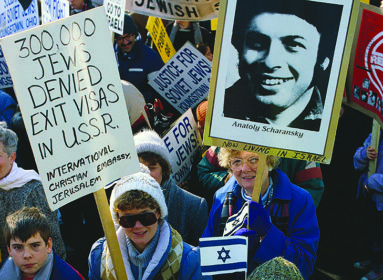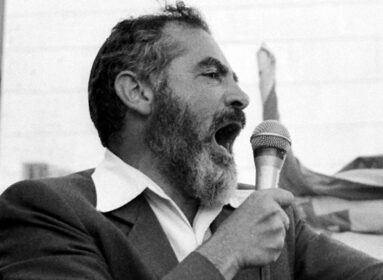
By David Gordon
Antisemites projected “Glory to our martyrs” on George Washington University’s Gelman Library, some five blocks from the White House, on Oct. 24. Six weeks later, some worried that a Chabad GW-sponsored, pre-Chanukah Nissim Black concert at Kogan Plaza, adjacent to the library, would be canceled on Dec. 5.
“Not only did we not get shut down, there were so many different black students that came to this show,” Black, an American-Israeli rapper, told JNS. “They are eating latkes and having sufganiyot.” (The Jewish delicacies refer to potato pancakes and jelly doughnuts.)
Chabad GW lit a menorah on the same site where the antisemitic message had been projected, which afforded some 350 attendees a symbol of light overcoming darkness, according to the 37-year-old, a black convert who identifies as Chassidic.
One attendee—a non-Jewish black man with dreadlocks—approached Black at the concert and told him that the rapper’s message inspired him on a rough day. He gave Black a hug, the rapper recalled.
“That is what we are supposed to be doing with our music and what we could do with our music,” Black told JNS.
He thinks that more can be done to improve relations between black and Jewish Americans, especially amid rising Jew-hatred. He told JNS that relations between the two communities started to sour well before Hamas terrorists attacked Israel nearly four months ago and before Kanye West (“Ye”) increasingly issued antisemitic statements.
“A lot of this started to happen with the riots after George Floyd and the world going back to the Dark Ages three years ago,” Black told JNS. (A white Minneapolis police officer was convicted of murdering Floyd, 46, a black man, on May 25, 2000.)
“On Oct. 7, so many light bulbs went off for me. How do we get back to this place of where we were allies?” Black told JNS. He noted that Rabbi Abraham Joshua Heschel, the Jewish lawyer Jack Greenberg and Rabbi Joachim Prinz, who spoke immediately before Martin Luther King Jr. at the 1963 March on Washington, marched with King.
Why, Black asked JNS, isn’t an under-represented voice like his, as a black Jewish artist, so absent from news reports on Israel?
“I’ve seen Fox, CNN, the media, and I have not seen so many black Jews speaking. How come nobody has reached out to me and the community?” he said. “If that’s not an ace card against ‘white colonialism,’ I don’t know what is.”
SUBHEAD: Academic affectation
When he thinks about the presidents of Harvard University, the Massachusetts Institute of Technology and the University of Pennsylvania who testified in a Dec. 5 House hearing that it would not necessarily violate their policies to call for the genocide of Jews, Black was struck by the double standard.
“If the same thing was being called for towards the genocide of black people, how well would that have gone over with the school?” he said. “There is no doubt about it.”
Not enough is being done to counter the blood libels that are proliferating to smear Jews and Israel, he added.
“To think that we are people who would even support or want the deaths of thousands of innocent people—that doesn’t even compute,” he said of Jews and Israel. “We understand that people die in war. But us as a whole, we are painted to be monsters. This is the opposite of what the Jewish people represent. That’s one of the things that needs to be projected more.”
SUBHEAD: Straight outta Seattle
Born in 1986 in Seattle, Damian Jamohl Black followed in the footsteps of his parents, who were hip-hop performers.
At the age of 13, he recorded his first song with a producer who went by the name “Vitamin D.” At the time, Black thought being surrounded by drugs, gangs and violence, in addition to police raids, was normal. When he was 19, his mother died from an overdose of pain medication.
Then under the name “D Black,” he released the album “The Cause and Effect” in 2007. Two years later, he released “Ali’yah” and began to receive wider attention both from fans and in the industry. The album performed well and was well-reviewed, and Black started getting invitations to perform at major music festivals.
After a religious journey that took him to other faith traditions, Black had a spiritual awakening and underwent an Orthodox Jewish conversion. He changed his name to Nissim (“miracles” in Hebrew), replacing his earlier musical themes of guns, drugs and violence with faith, identity and perseverance. He and his family live in Jerusalem.
“I started to realize, over the years, my responsibility to the world, and I think it came from understanding the Jewish responsibility to the world,” he told JNS. “As a Jew, we are called to be a light unto the nations.”
At press time, Black’s 2020 hit “Mothaland Bounce” had more than 5.2 million views on YouTube.
The internationally acclaimed artist is set to release an 18-track album, “Glory,” this spring. He told JNS that the new album will be an ode to God through soulful melodies, captivating lyrics and powerful production. Single titles include “Scream,” “Speed Dial,” “Better” and “Ayeh.”
“It’s really centered around faith and elevation,” he told JNS, describing the new music as “big black soul, black gospel, mixed with some very high energy pop-rock-type feel.”
Shalom Arush, a Breslov Chassidic rabbi in Israel, and other friends have encouraged Black to globalize his message rather than sticking to a Jewish niche. And so, he has heeded the call.
“I didn’t inherit an idea, or space, where I think my goal is to sit only in this quiet place and not influence or inspire the world,” he told JNS. “From the time I was a kid, this is what God has called me to do.”
“I feel like we all have a purpose, a reason why we are here,” he added. “My story, I hope, will show other people that sometimes you have to open yourself up into knowing what you don’t know.”
PHOTO: Nissim Black
CAP: Nissim Black. Photo by Tziporah Litman.







 Southern New England Jewish Ledger
Southern New England Jewish Ledger














